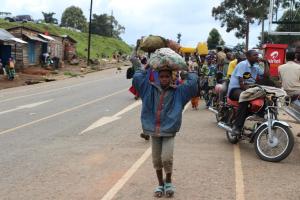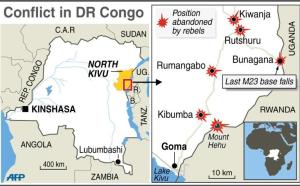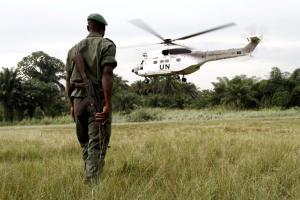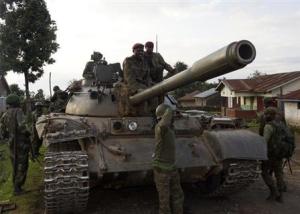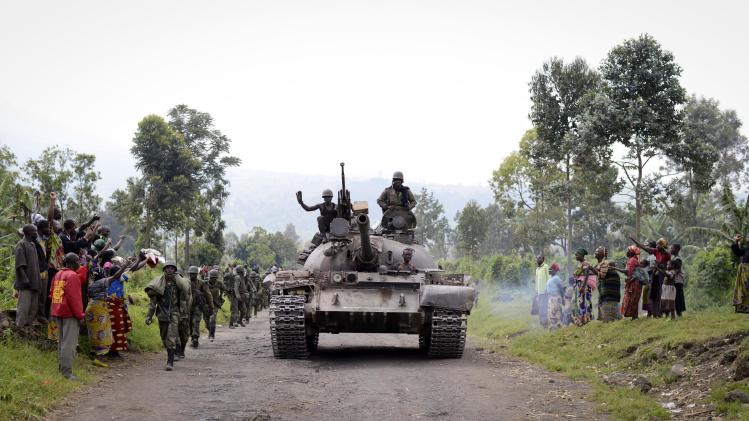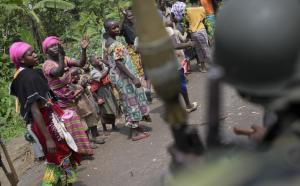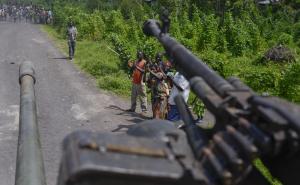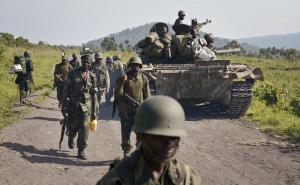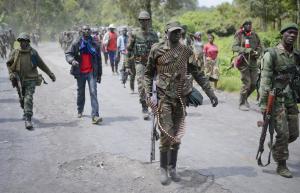DR Congo army in 'last phase' push against M23 rebels

By Habibou Bangre6 hours ago
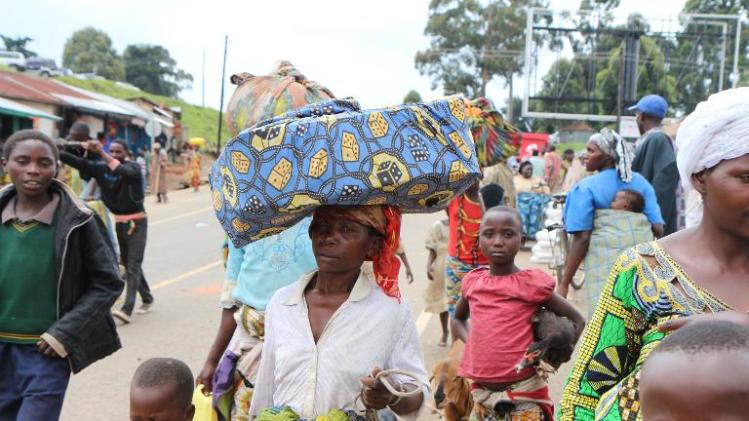
Kinshasa (AFP) - Democratic Republic of Congo troops assaulted positions of the M23 rebel movement on Thursday, after seizing their last stronghold in an attempt to finally break the back of the insurgency.
Troops were carrying out mopping-up operations to rout the final pockets of rebel resistance in territory near the Ugandan border, following an offensive launched six days earlier, a local resident in the town of Jomba said, reached by telephone.
"The soldiers spent the night here and then went to the front" at dawn, the Jomba resident said, asking not to be named and adding that a little girl had "been wounded by a bullet", but giving no details.
Sustained gunfire could be heard on the phone, as the source confirmed that the warring sides were also using heavy weapons. An AFP journalist on the Ugandan side of border could hear mortar fire.
A source in the UN mission in DR Congo (MONUSCO), which is helping the army, said the offensive against the M23 was in "the last phase", after the army captured the main rebel base at Bunagana on Wednesday.
Diehard M23 fighters, estimated at just a few hundred men, were dug in on three hills in farming territory about 80 kilometres (50 miles) north of Goma, the capital of strife-torn North Kivu province.
The Congolese army (FARDC) "has encircled the residual M23 positions to dislodge them. The operation is under way," the source said.
Since fighting resumed on October 25, after peace talks collapsed in Uganda, no UN troops have directly taken part in the offensive, but MONUSCO has provided government forces with intelligence, reconnaissance and logistical help.
After the fall of the rebel headquarters at Bunagana, President Joseph Kabila on Wednesday again urged the M23 fighters to "demobilise voluntarily", warning that his men would otherwise "make them do so by force".
Kabila said that "political and diplomatic solutions" remained on the negotiating table in Uganda's capital Kampala, where the rival sides have held stop-start talks since December and their representatives expressed guarded optimism.
"The negotiations are making progress," M23's deputy delegation chief Roger Lumbala said at midday Thursday. "Maybe today, they will have finished and we can put an accord on the table to sign it."
'A Tutsi cow, an M23 cow'
The M23 was founded by ethnic Tutsi former rebels who were incorporated into the Congolese army under a 2009 peace deal. They mutinied in April 2012, claiming that the pact had never been fully implemented.
Kinshasa and the United Nations charge that M23 is backed by neighbouring Rwanda and Uganda, an allegation the two neighbouring countries strongly refute.
At their strongest in November last year, M23 marched into Goma, a mining hub city of one million people, and took control for 10 days, before regional leaders persuaded them into fresh peace talks.
Conflict has displaced hundreds of thousands of people in North Kivu, a densely populated province rich in precious minerals and agricultural produce that has been a battleground for soldiers, rebels and militias for more than two decades.
Some 5,000 civilians crossed into Uganda at Bunagana between Monday and Wednesday, according to the United Nations, but on Thursday the refugees started trying to return to their homes in DR Congo.
"This morning we crossed back to go to our fields, but soldiers told us to turn round," said Imelda Nyirankusi, who had eight children in tow and a baby on her back. "We had the impression that gunshots were getting nearer."
Imelda said that she had fled Bunagana the previous day and then returned to Uganda after her bid to go back. The soldiers had "slit the throat of one of my fat cows... and eaten it, saying it was a Tutsi cow, an M23 cow," she added.
"How do you want me to go home if people kill my cows and make me feel I'm not wanted?" Imelda asked.
Troops were carrying out mopping-up operations to rout the final pockets of rebel resistance in territory near the Ugandan border, following an offensive launched six days earlier, a local resident in the town of Jomba said, reached by telephone.
"The soldiers spent the night here and then went to the front" at dawn, the Jomba resident said, asking not to be named and adding that a little girl had "been wounded by a bullet", but giving no details.
Sustained gunfire could be heard on the phone, as the source confirmed that the warring sides were also using heavy weapons. An AFP journalist on the Ugandan side of border could hear mortar fire.
A source in the UN mission in DR Congo (MONUSCO), which is helping the army, said the offensive against the M23 was in "the last phase", after the army captured the main rebel base at Bunagana on Wednesday.
Diehard M23 fighters, estimated at just a few hundred men, were dug in on three hills in farming territory about 80 kilometres (50 miles) north of Goma, the capital of strife-torn North Kivu province.
The Congolese army (FARDC) "has encircled the residual M23 positions to dislodge them. The operation is under way," the source said.
Since fighting resumed on October 25, after peace talks collapsed in Uganda, no UN troops have directly taken part in the offensive, but MONUSCO has provided government forces with intelligence, reconnaissance and logistical help.
After the fall of the rebel headquarters at Bunagana, President Joseph Kabila on Wednesday again urged the M23 fighters to "demobilise voluntarily", warning that his men would otherwise "make them do so by force".
Kabila said that "political and diplomatic solutions" remained on the negotiating table in Uganda's capital Kampala, where the rival sides have held stop-start talks since December and their representatives expressed guarded optimism.
"The negotiations are making progress," M23's deputy delegation chief Roger Lumbala said at midday Thursday. "Maybe today, they will have finished and we can put an accord on the table to sign it."
'A Tutsi cow, an M23 cow'
The M23 was founded by ethnic Tutsi former rebels who were incorporated into the Congolese army under a 2009 peace deal. They mutinied in April 2012, claiming that the pact had never been fully implemented.
Kinshasa and the United Nations charge that M23 is backed by neighbouring Rwanda and Uganda, an allegation the two neighbouring countries strongly refute.
At their strongest in November last year, M23 marched into Goma, a mining hub city of one million people, and took control for 10 days, before regional leaders persuaded them into fresh peace talks.
Conflict has displaced hundreds of thousands of people in North Kivu, a densely populated province rich in precious minerals and agricultural produce that has been a battleground for soldiers, rebels and militias for more than two decades.
Some 5,000 civilians crossed into Uganda at Bunagana between Monday and Wednesday, according to the United Nations, but on Thursday the refugees started trying to return to their homes in DR Congo.
"This morning we crossed back to go to our fields, but soldiers told us to turn round," said Imelda Nyirankusi, who had eight children in tow and a baby on her back. "We had the impression that gunshots were getting nearer."
Imelda said that she had fled Bunagana the previous day and then returned to Uganda after her bid to go back. The soldiers had "slit the throat of one of my fat cows... and eaten it, saying it was a Tutsi cow, an M23 cow," she added.
"How do you want me to go home if people kill my cows and make me feel I'm not wanted?" Imelda asked.
====================
BBC Reporting..........
29 October 2013 Last updated at 13:14 ET
DR Congo M23 rebels 'all but finished', says UN
 Government forces celebrate the
capture of Rumangabo
Government forces celebrate the
capture of Rumangabo
The UN's special envoy in the
Democratic Republic of Congo has told the organisation's Security Council that
the M23 rebel movement is all but finished as a military threat.
Martin Kobler said the M23 had abandoned most military positions in the east and was confined to a small triangle close to the Rwandan border.
A fifth rebel-held area in a week fell to government forces on Monday.
The rebels say that their withdrawals are temporary.
Mr Kobler told the UN Security Council by video-link: "It is practically the military end of the M23."
He said the rebels had abandoned a key position on Mount Hehu near the Rwandan border.
Continue reading the main story
The military option was not the route that regional actors and the UN favoured. But as the humanitarian crisis escalated in eastern DR Congo, a military alternative seemed acceptable, even desirable.
The Congolese army was emboldened by the deployment of a UN mission with a robust mandate to attack the rebels using helicopters.
While the military defeat of the M23 is a psychological victory for the government, the region's problems are far from over.
Ethnic-based groups, including those linked to the Rwandan genocide, still operate. A new rebel group, M18, recently emerged, adding to the complex mix of the conflict.
Several issues lie behind the unrest, including a competition for resources and a history of ethnic rivalry.
Add the involvement of regional actors in a vast area with weak state institutions and it is clear that bringing peace to eastern DR Congo is not a straightforward matter.
Analysis
There is no dispute that the M23 rebels are facing a military defeat.The military option was not the route that regional actors and the UN favoured. But as the humanitarian crisis escalated in eastern DR Congo, a military alternative seemed acceptable, even desirable.
The Congolese army was emboldened by the deployment of a UN mission with a robust mandate to attack the rebels using helicopters.
While the military defeat of the M23 is a psychological victory for the government, the region's problems are far from over.
Ethnic-based groups, including those linked to the Rwandan genocide, still operate. A new rebel group, M18, recently emerged, adding to the complex mix of the conflict.
Several issues lie behind the unrest, including a competition for resources and a history of ethnic rivalry.
Add the involvement of regional actors in a vast area with weak state institutions and it is clear that bringing peace to eastern DR Congo is not a straightforward matter.
After the UN meeting, French ambassador Gerard Araud
said he hoped there would now be talks between the rebels and the
government.
He said: "Mr Kobler has briefed us and basically he told us that we are witnessing the military end of the M23.
"So I think it's a positive development of course and there was a general agreement that now we should go back to the table of negotiation in Kampala."
Peace talks between the government and M23, hosted by neighbouring Uganda, broke down last week.
There had previously been about two months of relative calm in eastern DR Congo.
'Retreating rebels'
Cheering crowds reportedly welcomed government troops on Monday as they entered Rumangabo town, where the latest M23 base to fall was located.
The government is re-establishing its rule there, said North Kivu province governor Julien Palukui.
"We have just held two meetings in order to discuss how to uplift the population... and we are announcing the restoration of the civil service within the next 24 hours,'' he added.
Rumangabo - about 50km (30 miles) north of Goma, the main city in eastern DR Congo - had one of the three biggest military bases in DR Congo before it fell to the rebels last year.
There is no doubt that the government forces have achieved huge victories over the rebels, says the BBC's Maud Jullien in the capital, Kinshasa.

The UN has deployed a new intervention brigade to eastern DR Congo with a stronger mandate to confront armed groups.
On Sunday, the UN mission in DR Congo, Monusco, said a Tanzanian peacekeeper was killed during fighting with the M23 in the town of Kiwanja.
"The soldier died while protecting the people of Kiwanja," Monusco said in a statement.
The military success in Rumangabo followed the capture of four other areas - Kiwanja, Rutshuru, Buhumba and Kibumba - since the weekend, the army said.
M23 officials in Uganda said their fighters had retreated because government and UN forces had launched a joint assault, reports the BBC's Ignatius Bahizi from Uganda's capital, Kampala.
Rebel forces were outnumbered, they said.
M23 fighters planned to regroup before making their next move, the officials added.
At least 800,000 people have fled their homes in DR Congo since the M23 launched its rebellion in April 2012, the UN humanitarian agency, Ocha, says.
The rebels briefly occupied eastern DR Congo's main town, Goma, in November 2012 before pulling out under international pressure.
The M23 are mainly ethnic Tutsis, like most of Rwanda's leaders.
Rwanda and Uganda deny persistent Congolese and UN allegations that the neighbours are backing the rebel forces.
Eastern DR Congo has been wracked by conflict since 1994, when Hutu militias fled across the border from Rwanda after carrying out a genocide against Tutsis and moderate Hutus.
============================
25 March 2013 Last updated at 08:20 ET
Democratic Republic of Congo profile

A vast country with immense economic
resources, the Democratic Republic of Congo (DR Congo) has been at the centre of
what could be termed Africa's world war. This has left it in the grip of a
humanitarian crisis. The five-year conflict pitted government forces, supported
by Angola, Namibia and Zimbabwe, against rebels backed by Uganda and Rwanda.
Despite a peace deal and the formation of a transitional government in 2003, people in the east of the country remain in terror of marauding militias and the army.
The war claimed an estimated three million lives, either as a direct result of fighting or because of disease and malnutrition. It has been called possibly the worst emergency to unfold in Africa in recent decades.
The war had an economic as well as a political side. Fighting was fuelled by the country's vast mineral wealth, with all sides taking advantage of the anarchy to plunder natural resources.
Continue reading the main story
At a glance
- DR Congo is struggling to recover from Africa's ''world war'' in which millions died between 1998 and 2003
- Former rebels joined a power-sharing government
- Eastern regions are still volatile despite 2013 peace agreement
- DR Congo hosts the UN's largest peacekeeping mission
The history of DR Congo has been one of civil war and
corruption. After independence in 1960, the country immediately faced an army
mutiny and an attempt at secession by its mineral-rich province of Katanga.
A year later, its prime minister, Patrice Lumumba, was seized and killed by troops loyal to army chief Joseph Mobutu.
In 1965 Mobutu seized power, later renaming the country Zaire and himself Mobutu Sese Seko. He turned Zaire into a springboard for operations against Soviet-backed Angola and thereby ensured US backing. But he also made Zaire synonymous with corruption.
After the Cold War, Zaire ceased to be of interest to the US. Thus, when in 1997 neighbouring Rwanda invaded it to flush out extremist Hutu militias, it gave a boost to the anti-Mobutu rebels, who quickly captured the capital, Kinshasa, installed Laurent Kabila as president and renamed the country DR Congo.
Nonetheless, DR Congo's troubles continued. A rift between Mr Kabila and his former allies sparked a new rebellion, backed by Rwanda and Uganda. Angola, Namibia and Zimbabwe took Kabila's side, turning the country into a vast battleground.
Continue reading the main story

DR Congo's conflicts

- Enyele rebels in Equateur: Decades-old conflict over fishing rights evolved into ethnic tussle for economic and political power in north-west. Some 200,000 refugees have fled violence since 2009
- Ugandan rebels in north-east: Uganda's Lord's Resistance Army (LRA) rebels remain active here and in neighbouring countries, raping and killing
- Rwandan rebels in the Kivus: Hutu and Tutsi rebel militia operate in North and South Kivu. The UN oversaw a peace agreement in 2013 with the M23 Movement, which it says is backed by Rwanda and Uganda
- Ituri rebels near oil finds: North-eastern province has been quiet since a 2007 peace accord, encouraging oil firms to tap reserves in Lake Albert on Ugandan border.
Coup attempts and sporadic violence heralded renewed
fighting in the eastern part of the country in 2008. Rwandan Hutu militias
clashed with government forces in April, displacing thousands of civilians.
Another militia under rebel General Laurent Nkunda had signed a peace deal with the government in January, but clashes broke out again in August. Gen Nkunda's forces advanced on government bases and the provincial capital Goma in the autumn, causing civilians and troops to flee while UN peacekeepers tried to hold the line alongside the remaining government forces.
In an attempt to bring the situation under control, the government in January 2009 invited in troops from Rwanda to help mount a joint operation against the Rwandan rebel Hutu militias active in eastern DR Congo.
Rwanda arrested the Hutu militias' main rival, Gen Nkunda, a Congolese Tutsi hitherto seen as its main ally in the area.
In early 2013 the UN secured a regional agreement to end the M23 rebellion in eastern areas, and the group's alleged founder Bosco Ntaganda surrendered to the International Criminal Court to face war-crimes charges.
Rwanda and Uganda denied UN accusations that they had supported the M23 group, but the region remains volatile.

